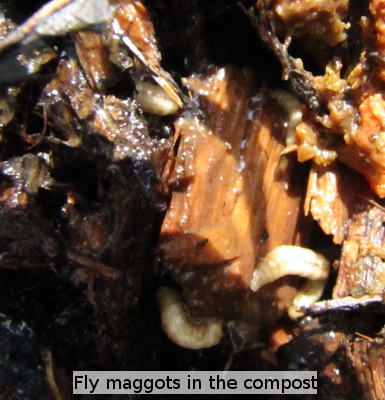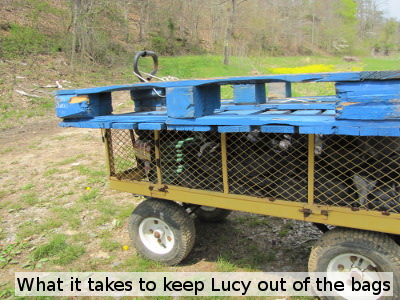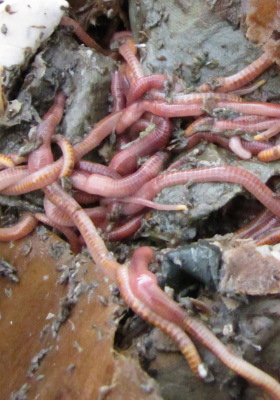
Mid-scale worm bin problems
 Mark
and I have had to make the hard decision to call our worm
bin project a
failure. Many of the problems have or could be fixed --- the bad
smell resulting from Lucy breaking into the compost
bin repeatedly and
uncovering the scraps (solved), the trashy look and nastiness when Lucy
broke into the food bags before they went into the bin (solved), the
rat that made a home in the worm bin (solved), the flies that laid their
eggs in the compost bin at the advent of hot weather (solvable), the
"eww" factor when opening bags of old food scraps (solvable.) The
insurmountable problem is time.
Mark
and I have had to make the hard decision to call our worm
bin project a
failure. Many of the problems have or could be fixed --- the bad
smell resulting from Lucy breaking into the compost
bin repeatedly and
uncovering the scraps (solved), the trashy look and nastiness when Lucy
broke into the food bags before they went into the bin (solved), the
rat that made a home in the worm bin (solved), the flies that laid their
eggs in the compost bin at the advent of hot weather (solvable), the
"eww" factor when opening bags of old food scraps (solvable.) The
insurmountable problem is time.
 Over
the last two months, I estimate that Mark and I have put in about
twenty hours picking up food scraps and doing worm
bin maintenance (not
counting the startup time.) In exchange, we've netted 1,226
pounds of food scraps, which I suspect might break down into about a
cubic yard of compost. To put that in perspective, it takes Mark
about two hours to shovel two cubic yards of amazing
horse manure
(basically worm castings) into the truck, or about three hours to drive
to town to pick up a similarly sized load of compost. Comparing
our worm bin project to these alternative methods of getting compost,
I'm afraid the juice just isn't worth the squeeze.
Over
the last two months, I estimate that Mark and I have put in about
twenty hours picking up food scraps and doing worm
bin maintenance (not
counting the startup time.) In exchange, we've netted 1,226
pounds of food scraps, which I suspect might break down into about a
cubic yard of compost. To put that in perspective, it takes Mark
about two hours to shovel two cubic yards of amazing
horse manure
(basically worm castings) into the truck, or about three hours to drive
to town to pick up a similarly sized load of compost. Comparing
our worm bin project to these alternative methods of getting compost,
I'm afraid the juice just isn't worth the squeeze.
 When
we embarked on the project, we had figured we'd feed some of the scraps
to our chickens, discovering just in time that we were going to be
breaking the law. If that had been possible, I suspect the food
scrap project would have been a success. The food scraps would
have been more valuable, replacing expensive storebought chicken feed
and the chickens would have dealt with rats, Lucy, and flies.
Alternatively, for folks who drive to school every day to pick up their
kids, the food scraps would have been fresh with less of a gross factor.
When
we embarked on the project, we had figured we'd feed some of the scraps
to our chickens, discovering just in time that we were going to be
breaking the law. If that had been possible, I suspect the food
scrap project would have been a success. The food scraps would
have been more valuable, replacing expensive storebought chicken feed
and the chickens would have dealt with rats, Lucy, and flies.
Alternatively, for folks who drive to school every day to pick up their
kids, the food scraps would have been fresh with less of a gross factor.
Although we're calling
it quits on collecting the school's food scraps, we aren't giving up on
worms. Now that the bin is rat-proof and the worm population is
expanding, I plan to give less-composted horse manure to the worms to
turn into castings. I suspect there will be no shortage of food
for our livestock.
Want more in-depth information? Browse through our books.
Or explore more posts by date or by subject.
About us: Anna Hess and Mark Hamilton spent over a decade living self-sufficiently in the mountains of Virginia before moving north to start over from scratch in the foothills of Ohio. They've experimented with permaculture, no-till gardening, trailersteading, home-based microbusinesses and much more, writing about their adventures in both blogs and books.
Want to be notified when new comments are posted on this page? Click on the RSS button after you add a comment to subscribe to the comment feed, or simply check the box beside "email replies to me" while writing your comment.

It seems to me that you go through one heck of a lot of compost just to feed two people on a relatively small plot of land. My guess would be that you are trying to improve a relatively poor soil.
If you need all this compost just to keep nutrient levels stable, I'd wonder if farming is a sustainable activity?
Most soil that's been farmed using traditional methods is poor and needs years of excess compost for optimal gardening. Our farm has variable soil --- half of our gardening area has quite poor soil because it was a badly managed pasture for years before we bought the place and the topsoil all eroded away. The other half of our gardening area has pretty good soil.
As a rule of thumb, you need about half an inch to an inch of compost per year to maintain the status quo when gardening organically, more if you want to improve your soil. This sounds like a lot (and it is --- 67 to 134 cubic yards of compost per acre for maintenance), but you have to keep in mind that compost is nearly all waste products. The composted manure we get for free locally is what's shoveled out of a stables and the compost we bought last year is the same but from a chicken farm. This waste would create public health problems if left alone (not so much the horse manure since there are fewer of horses per capita, but you get the picture.) Compost recycles that "waste" back into the food stream.
Saying that farming isn't sustainable just because it requires a lot of compost is like saying humans aren't sustainable because we have to eat every day. Biology is messy and requires constant inputs and outputs, but life is worth it!
Biology is messy and requires constant inputs and outputs, but life is worth it!
Why not do thermal composting the food scraps in tall bins (built iwth scrap non-treated odds and ends of wood)? Since you've got the worms anyways, you can always throw some in once the heap cools down but is still composting. I volunteer in the compost area of a school in my city and through frequent abundant supplies of the green material, combined with frequent turning -- we produce finished compost in about 3 months. I do the turning and it takes me just 10 - 15 minutes of sustained shoveling to turn the contents of one bin into the neighbouring bin. The time-consuming part is screening. The compost supervisor wants good grade compost so he wants it screening very fine but the taks could be made much easier by screening with 1/2 mesh rather than 1/4 mesh (I've tried it -- larger holes mena screening time is much reduced)
Dogs and raccoons can be kept out by having a top flap lid that locks.
I was asking myself what am I missing here? Why not take all the biomass one can get? Then it occured to me that maybe the value of the horse manure is equal/exceeds the value of the composted food scraps, so it's about conserving human time and energy?
Thanks!
It sounds like that type of system is best suited to composting in-place (i.e. at the school), or large-scale collection and bulk composting (as some municipal councils do here).
At a medium scale but offsite, the labour and transportation seem to outweigh the benefits.